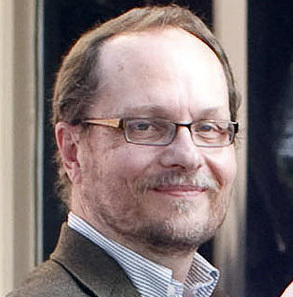Dr. Randy Markley, associate professor of accounting and finance, had a nontraditional journey into teaching. He spent years working around the clock in his family-owned business and then almost three decades in industry. A class with Markley may involve games or puzzles, or talking about truck driving or ice cream, and a lot less math than you’d think. Mostly, though, it will revolve around doing the right thing.
Markley received both his bachelor’s degree in business and his MBA from the University of La Verne. He later received an MPA from USC and his doctorate from the University of Florida. Here, Markley shares his roots in business and how board games connect to accounting.
You were doing business long before you had a degree in business!
I cut my teeth in a family-owned food distribution company with my father, doing journal entries by hand, preparing financial statements in pencil — I wore every hat. A family business is tough. It's seven days a week with few days off. When I got engaged, I thought, "I'm not going to be married and work every day!" So I came to Southern California, working for Knudsen as a Teamster driving 18-wheelers, delivering milk. My blue collar roots! But I had all this experience in my family business so I got promoted and went into an executive leadership program, and so began my corporate career.
My last position was with a midwest company, Wells Enterprises Corp. They make great products like Blue Bunny ice cream. Ultimately, I was running half of the country as a division manager, not just doing financial planning but managing the pro-formas, hiring and training staff, managing a network of distributors, and overseeing contract negotiations. I was making multimillion dollar investment decisions, like expanding into California. Sales exploded, but the recession hit, layoffs hit, and they bought out my pension, so I went back to school.
How did you get into higher education?
I was in my MBA program when I was laid off. It was John Stupar at La Verne — who has mentored several business faculty here — who said, “Have you thought about teaching? You're a good student, you interact well with people, but you’ll need to get your doctorate.”
I realized I'd been in the business world almost 30 years, and most of my work hadn’t really been finances or operations. It had really been teaching; explaining a financial plan, hiring and training staff, presenting my strategic plans to roomfuls of executives. Every time, I had to clearly present information and anticipate questions. It was all teaching and I loved it!
Students often don’t look forward to accounting class. Why is it important?
First, all departments — legal or marketing or sales or operations — have to budget and have to manage finances.
Second, what we give students is not just the basics — "How do we do it?" — but we want to go deeper. Budgeting is basically forecasting, and so we forecast and then decide, how do we manage the resources, the finances, the capital and everything else?
So they get skills and understanding. They understand, "How do those numbers get there, how do we ensure they're correct, how do they link together?" If they want to start their own business, it’s crucial. It enables them to ask, "Is this part of my business working well?"
It also gives them skills to be ethical. I think what’s often overlooked in the corporate world is how we treat our employees and our communities. If an unethical manager makes a fraudulent or lazy financial decision that leads to laying somebody off, what is the impact on a family or a community? Let's learn how to look at all the other alternatives, so maybe we don't have to do that. Tying skills with ethics is a valuable frame of reference for anyone in any career.
Accounting and finance are complicated. How do you make it accessible?
I do two things. First I ask, “Do you like puzzles? Do you like to play games, strategic games, like Risk or Monopoly or even chess?” That's really what we're doing here.
Today in class, I said, “Here's an income statement. Let's make some assumptions and then forecast. What if sales increased by this much and taxes went up and interest went down, what would happen to your bottom line?” I had a student come up after class and say, “Thank you! The way you explained it, it was fun!” These were concepts that weren't easy, but for her it was fun, so she liked it, and so she understood it.
The second thing: Most students come in thinking this is a math class. Well, we're going to use the math, but we're not going to do the math. We use the formulas, but it's not really about that; it's a concepts class. Now, in order to get the concepts, you have to get the terms. Terms like “EBIT” — yes, it means “earnings before interest and tax,” but functionally it's operating margin — if you understand it and how it works, even the math becomes fun. If you walk out of my finance class with a good knowledge of terms and concepts, it changes everything, and the math just falls into place.
If I focused only on the computations, you may know how to compute something but you wouldn’t understand the why. Developing and building skills in the use of reason and logic is highly valuable to employers across all sectors.
What’s your favorite thing about being at Biola?
Being here is a chance to use my gifts, but it's also about sharing my passion for right practices and my heart for these students. It's wonderful to be able to pray for my students, and weave in biblically based ethical considerations. A lot of secular schools — including the ones I graduated from — put great emphasis on ethical decisions. But as Christians, we should own this space, because we know why we all have great worth to God.
And it’s dangerous to think that every Crowell graduate will automatically make Godly choices and always put people first, because they’re walking into a pressure-packed world that does not put people first. The world puts numbers first.
So I present scenarios I know will happen: A boss will ask you to do something sketchy. There’s an unfair decision and you have to carry it out. What do you do? Our graduate students say, “That just happened last week!” It's harder to get undergrads to see it, but I don't want them to go unaware into business and boom, get hit with a situation and say, “I never knew something like this could happen!”
They're not just going to walk into this rosy business world where everybody's going to agree with their ethics. Sometimes they will, but from my experience, usually they won’t. It goes beyond just taking business principles and deciding, “Hey, this is a good financial decision.” We first need to think about how it impacts people.
To learn more about the classes Randy Markley teaches and other programs at the Crowell School of Business, visit biola.edu/crowell.
 Biola University
Biola University



.jpg)
.jpg)
